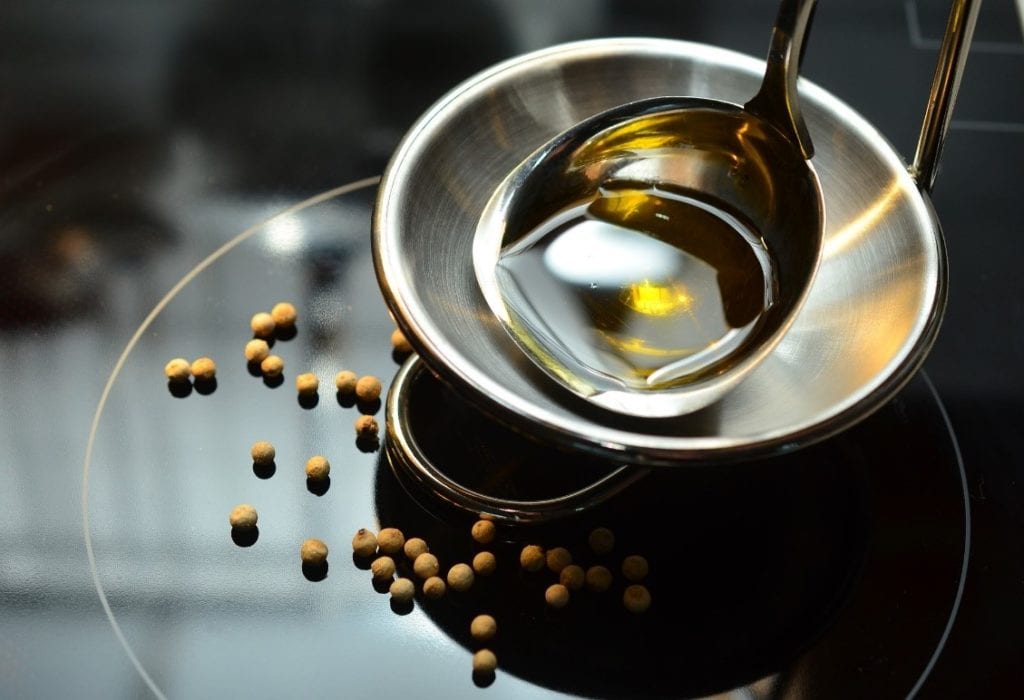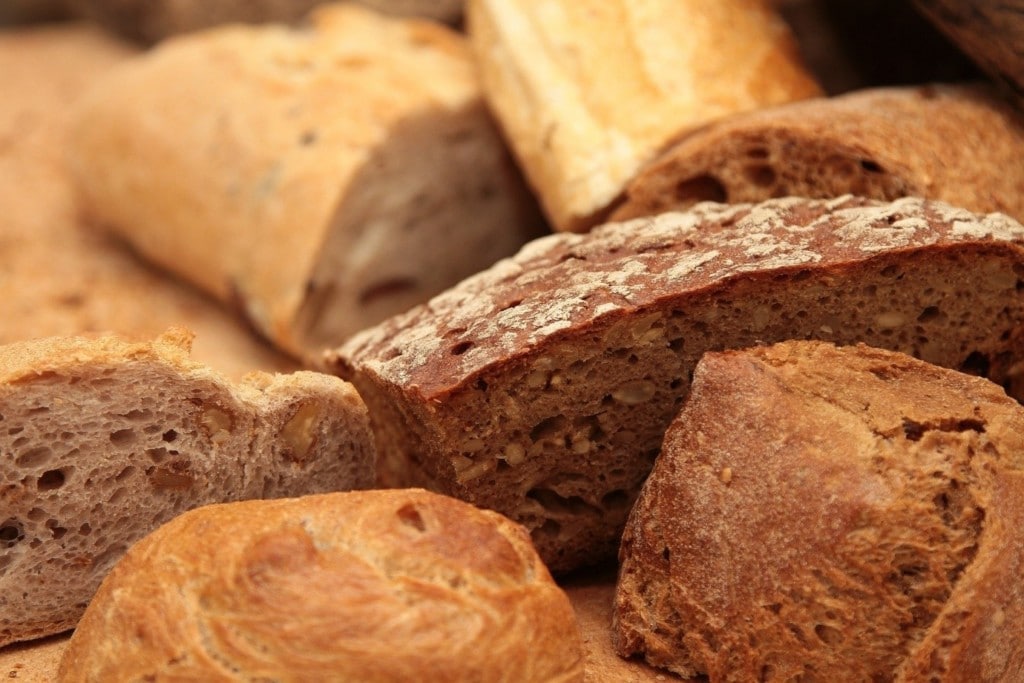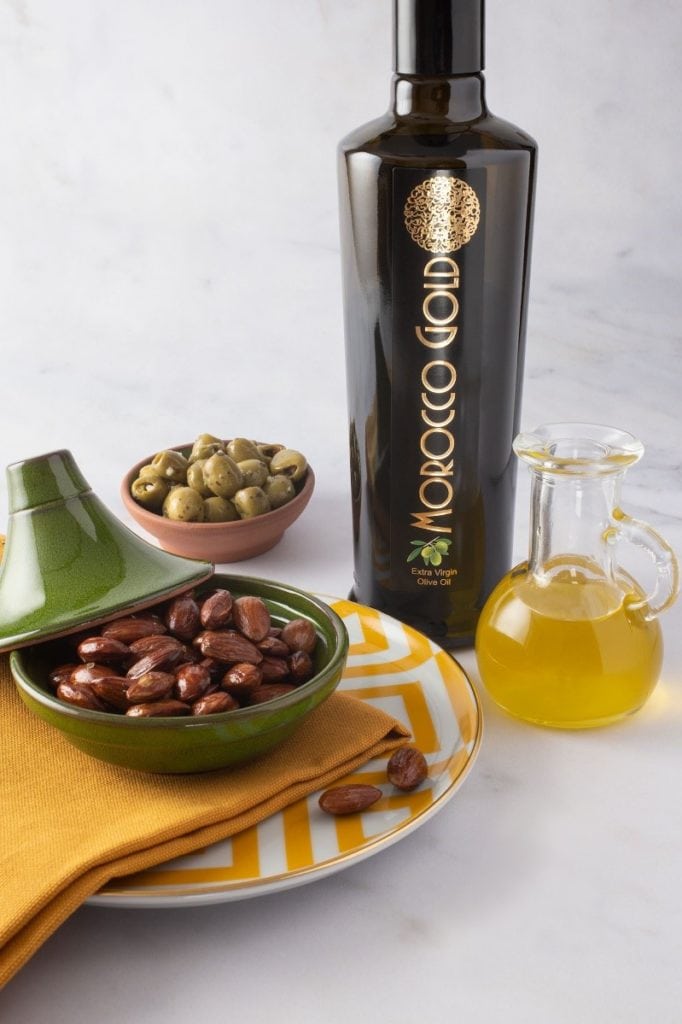Extra Virgin Olive Oil: Fact V Fiction
Updated November 14th 2024

Summary
- The smoke point of a cooking oil is the temperature at which it starts to give off potentially harmful toxins.
- The smoke point of extra virgin olive oil is actually higher than other common cooking oils
- The shelf life of extra virgin olive oil can be improved with proper care at home
- Extra Virgin Olive Oil is a great choice for baking and frying
Contents
Don’t Be Put Off By The Olive Oil Myths
Extra virgin olive oil, often referred to as “liquid gold,” is a staple in many kitchens worldwide. Its rich flavour and numerous health benefits make it a favourite among foodies and health enthusiasts alike. However, despite its popularity, many myths surround this revered oil. To celebrate the five-year anniversary of Morocco Gold Extra Virgin Olive Oil, let’s explore and debunk the top five myths that have persisted about this culinary treasure.
Extra Virgin olive oil is a healthy and versatile cooking oil that has been used for centuries. Although it has a smoke point of only about 350 degrees Fahrenheit, it is still suitable for many cooking methods. In fact, the smoke point of extra virgin olive oil is actually higher than that of other common oils, such as canola oil and vegetable oil. However, there are several myths about olive oil that have been circulating in recent years. For example, some people believe that olive oil is not suitable for high-heat cooking methods, such as frying. Others believe that olive oil will turn rancid quickly if it is not stored properly. The truth is that olive oil is a stable and sturdy cooking oil that can withstand moderate heat without breaking down. With proper care, it can last for many months or even years without going bad. So next time you’re looking for a healthy and flavorful cooking oil, reach for the olive oil instead of the vegetable oil.
The Olive Oil Smoke Point Myth?
Extra virgin olive oil, often referred to as “liquid gold,” is a staple in many kitchens worldwide. Its rich flavour and numerous health benefits make it a favourite among foodies and health enthusiasts alike. However, despite its popularity, many myths surround this revered oil. To celebrate the five-year anniversary of Morocco Gold Extra Virgin Olive Oil, let’s explore and debunk the top five myths that have persisted about this culinary treasure.
As we continue our Five-Year Anniversary celebrations at Morocco Gold, we have taken the opportunity to debunk the five most common myths about extra virgin olive oil. Which are;
Extra Virgin olive oil is a healthy and versatile cooking oil that has been used for centuries. Although it has a smoke point of only about 350 degrees Fahrenheit, it is still suitable for many cooking methods. In fact, the smoke point of extra virgin olive oil is actually higher than that of other common oils, such as canola oil and vegetable oil. However, there are several myths about olive oil that have been circulating in recent years. For example, some people believe that olive oil is not suitable for high-heat cooking methods, such as frying. Others believe that olive oil will turn rancid quickly if it is not stored properly. The truth is that olive oil is a stable and sturdy cooking oil that can withstand moderate heat without breaking down. With proper care, it can last for many months or even years without going bad. So next time you’re looking for a healthy and flavourful cooking oil, reach for the olive oil instead of the vegetable oil.
The truth is, extra virgin olive oil actually has a reasonably high smoke point, around 375-410°F (190-210°C). This makes it perfectly suitable for most cooking methods, including sautéing and frying. The belief that it can’t withstand heat likely stems from misunderstandings about what the smoke point really is.
In reality, the smoke point refers to the temperature at which an oil begins to break down and produce smoke. Extra virgin olive oil’s antioxidant properties help it maintain its integrity better than many other oils, even at higher temperatures. This means you can confidently use it in your everyday cooking without worrying about losing its beneficial qualities.
According to a great summary on SeriousEats.com the smoke point of an oil is:
The temperature at which it stops shimmering and starts sending out some serious smoke signals.
Seriouseats.com
When it comes to cooking, smoke point is an important consideration. This is the temperature at which an oil starts to smoke and break down, releasing harmful toxins.Extra virgin olive oil has a smoke point of around 375-410 degrees Fahrenheit, making it ideal for most cooking methods.
However, it’s important to keep in mind that the smoke point decreases as the oil is heated multiple times. As a result, it’s best to use a moderate heat when cooking with extra virgin olive oil. When used correctly, this healthy cooking oil can add delicious flavor to your food without sacrificing safety.
Extra Virgin Olive Oil Matures With Age
Contrary to popular belief, extra virgin olive oil does not mature or improve with age like fine wine.
In fact, olive oil is best enjoyed fresh, capturing the vibrant flavours of the season. The aging myth might arise from the misconception that all foods improve over time, but this isn’t the case for olive oil. Freshness is key when it comes to maximizing the complex flavours and health benefits.
Regularly updating your supply ensures you’re getting the most out of your olive oil. Remember, the fresher the oil, the more potent the antioxidants and polyphenols, contributing to its renowned health benefits.
All olive oils, extra virgin included, will deteriorate with age and are best consumed as fresh as possible – ideally within the first few months of purchase. To prolong the freshness of your extra virgin olive oil, it is best to store it in a dark place within an airtight container when not in use. Other tips on how to store your extra virgin olive oil can be found here and include the advice to keep it away from the fridge. If you store your olive oil in the fridge it will eventually solidify, and condensation will promote oxidation – which is not good for extra virgin olive oil!
You Can’t Bake With Olive Oil
Many people believe that extra virgin olive oil can’t be used for baking, limiting its versatility in the kitchen.
On the contrary, extra virgin olive oil can be an excellent substitute for butter or other oils in baking recipes. It adds a unique flavour and moistness to baked goods, enhancing cakes, muffins, and breads. The key to successful baking with olive oil is to adjust the amount appropriately, as it has a different texture and density than butter. By experimenting with olive oil in your baking endeavours, you can create delicious and healthier treats. Its healthy fats can even help reduce the saturated fat content in your favourite recipes, making them more heart-friendly.

A good quality extra virgin olive oil, such as Morocco Gold, is an excellent choice for the keen baker. Not only does it offer considerable health benefits when compared with some other fats but it also gives you baking a unique and flavoursome taste. This monounsaturated fat helps keep your cholesterol in check as well as offering a host of antioxidants that are essential for healthy living. Incorporating a more monounsaturated or polyunsaturated source of fat rather than just saturated fats. Compared to vegetable oils, extra virgin olive oil is free from chemicals and other impurities that compromise both the nutrients and flavour of the ingredient. But using extra virgin olive oil in a recipe that calls for butter isn’t quite an equal comparison. When a recipe calls for butter, you’ll want to use ¾ of that amount. For example, if the recipe needs six ounces of butter, use just four ounces of extra virgin olive oil.
Why isn’t it an even swap? Extra virgin olive oil is 100% fat while butter is only 80% fat. If you’re swapping regular canola or vegetable oil for extra virgin olive oil, it will be an even substitute.
The Colour of Extra Virgin Olive Oil Is A Mark Of Quality
Perhaps the most misleading myth about olive oil is that its colour determines its quality.
The colour of extra virgin olive oil can vary widely, ranging from deep green to golden yellow, depending on factors such as the olive variety, harvest time, and processing method. However, colour is not an indicator of quality. A dark green oil is not necessarily better than a golden one.
The true test of quality lies in the oil’s taste and aroma. High-quality extra virgin olive oils should have a balanced flavour profile with fruity, bitter, and peppery notes. Trust your senses rather than the shade of the oil when choosing the best option for your culinary creations.

Polyphenols In Morocco Gold
It seems like an obvious indicator of quality but the colour of extra virgin olive oil, say many experts, is not a reliable judge of quality or purity. Renowned Olive Oil expert Tom Mueller – writing in his book ‘Extra Virginity’ said: “Don’t pay much attention to the colour of an oil. Good oils come in all shades, from vivid green to gold to pale straw.” Taste and smell are much more important indicators of freshness and quality and – in the case of Morocco Gold – are the truest testament to the care and attention to detail throughout the entire production process.
This year’s harvest of Morocco Gold has the highest ever concentration of health boosting antioxidants (or polyphenols) at 644mg/kg and an exceptionally low acidity level of 0.2%. The end result is a multiple gold award winner for its green fresh fruity taste, with hints of sweet almonds, fresh turf and herbs.
Storing Your Bottle Of Extra Virgin Olive Oil Next To The Hob Is The Best Place
To prolong the freshness of your extra virgin olive oil, it is best to store it in a dark place within an airtight container when not in use. Other tips on how to store your extra virgin olive oil can be found here and include the advice to keep it away from the fridge. If you store your olive oil in the fridge it will eventually solidify, and condensation will promote oxidation – which is not good for extra virgin olive oil!
Conclusion
By debunking these common myths, we hope to shed light on the true potential of extra virgin olive oil in your kitchen. Whether you’re a seasoned foodie or a health enthusiast, understanding the facts about this “liquid gold” empowers you to make informed choices.
Celebrate the remarkable versatility and health benefits of extra virgin olive oil by experimenting with it in various culinary applications. And if you’re seeking further guidance or tips on how to incorporate it into your cooking repertoire, consider connecting with Morocco Gold—a brand dedicated to delivering premium quality olive oil while dispelling myths and promoting culinary excellence.
Ready to explore the endless possibilities of extra virgin olive oil? Start by trying out Morocco Gold for yourself and experience the rich flavours that only the finest extra virgin olive oil can offer.
